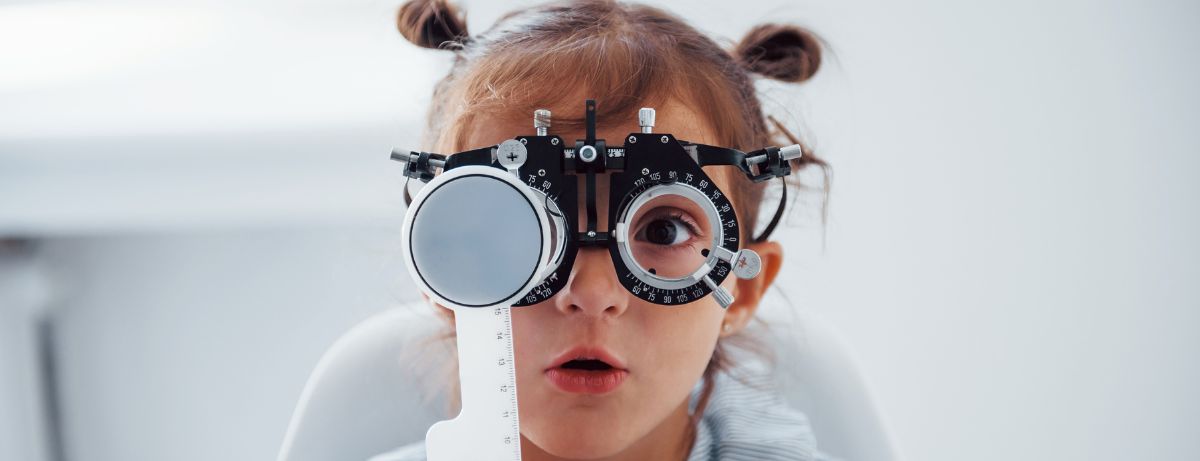Children’s Eye Health: Why Regular Exams Are Essential for Kids

When it comes to your child’s overall health, don’t forget about their eyes. Children’s eye health is crucial for their development, learning, and well-being.
In this blog post, we’ll delve into the importance of regular eye exams for kids. We’ll explore how these exams play a vital role in detecting potential issues, ensuring clear vision and setting the foundation for a lifetime of healthy eyes.
Why Early Eye Exams Matter
Did you know that much of a child’s learning happens through their eyes? From reading and writing to observing the world around them, good vision is essential for academic success and overall development. Early eye exams help detect any vision problems that may hinder your child’s ability to learn and thrive. Some common eye conditions in children, like nearsightedness, farsightedness, and astigmatism, can be easily corrected with glasses or other appropriate interventions when identified early. By addressing these issues promptly, you empower your child to reach their full potential in school and daily life.
Detecting Eye Conditions
Regular eye exams for children are not just about checking visual acuity; they also play a crucial role in detecting eye conditions that may go unnoticed without a professional evaluation. Some conditions, such as lazy eye (amblyopia) or misalignment of the eyes (strabismus), are easier to treat when identified early in childhood. Left untreated, these conditions can lead to permanent vision impairment or even affect the child’s depth perception and overall visual development. Early intervention through comprehensive eye exams can help correct these issues and prevent long-term consequences.
Protecting Eye Health
Children are naturally curious and engage in various activities that can put their eyes at risk. Regular eye exams allow eye care professionals to assess and provide guidance on protecting your child’s eyes from potential hazards. Whether it’s using protective eyewear during sports, practicing good eye hygiene, or understanding the impact of excessive screen time, these exams offer an opportunity for parents to learn valuable tips and strategies to safeguard their child’s eye health. By fostering healthy habits and ensuring proper eye care, you’re setting the foundation for a lifetime of optimal vision.
The Importance of Comprehensive Exams
Comprehensive eye exams for children encompass more than just visual acuity tests. They involve a thorough evaluation of various aspects, including eye coordination, focusing ability, depth perception, and overall eye health. These exams can detect not only refractive errors but also underlying conditions such as eye infections, allergies, or even early signs of systemic diseases that may manifest in the eyes. By opting for comprehensive eye exams, you give your child the best chance of receiving a comprehensive assessment and appropriate care tailored to their individual needs.
When to Schedule an Exam
Now that you understand the significance of regular eye exams for children, you may wonder when to schedule the first one. The American Optometric Association recommends an initial comprehensive eye exam for infants at six months of age, followed by exams at age three and again before starting school. After that, regular exams every one to two years are typically sufficient, unless specific issues or concerns arise. However, remember that every child is unique, and some may require more frequent or specialized eye care. Consult with an eye care professional to determine the best schedule for your child’s needs.
The Gift That Lasts a Lifetime
Regular eye exams for children offer early detection, timely intervention, and invaluable guidance to ensure optimal vision and overall well-being. By prioritizing your child’s eye health, you give them the best opportunity to thrive academically, explore the world around them, and reach their full potential. So, schedule those eye exams, provide your child with the gift of clear vision, and watch them shine brightly every step of the way!
MEDICAL DISCLAIMER: The content of this Website or Blog is not intended to be a substitute for professional medical advice, diagnosis, or treatment. Always seek the advice of your physician or other qualified health provider with any questions you may have regarding a medical condition. Never disregard professional medical advice or delay in seeking it because of something you have read on this Website or Blog.
If you think you may have a medical emergency, call 911 immediately, call your doctor, or go to the emergency room/urgent care.
